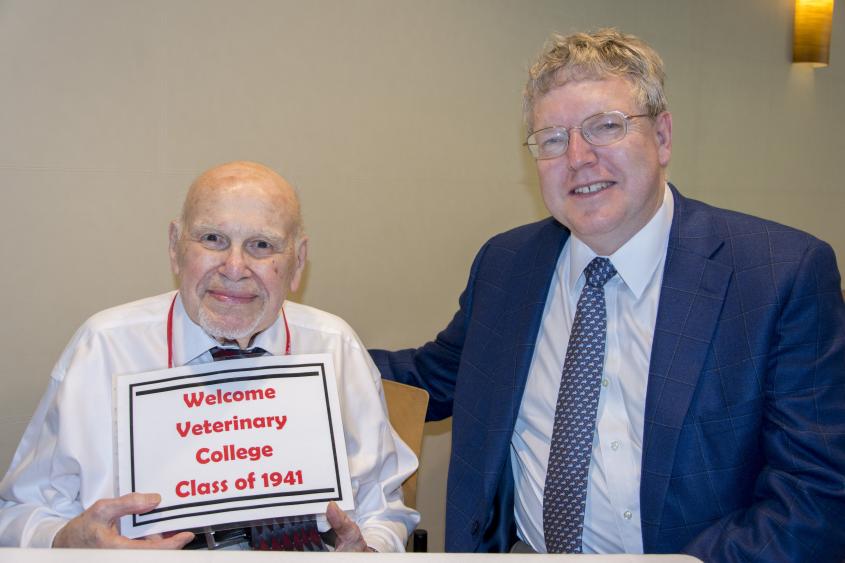Dr. Samuel Bender ’41: The Centenarian Veterinarian
CVM_Reunion-2016_Class1941 (2).jpg

Dr. Samuel Bender '41 with Dean Lorin Warnick at the Cornell University College of Veterinary Medicine's 2016 reunion.
Times have changed a bit since Dr. Samuel Bender ’41 was a veterinarian. “Back when I started, we didn’t even have penicillin,” he says. “Our practice depended a lot on how to take care of the animal until nature healed them.” He recalls what one of his Cornell professors, Dr. Howard J. Milks, professor of therapeutics and small animal diseases, would tell his students: “Now boys, nature will heal 90-some percent of your cases, medicine will heal a small percent, and there’s some cases where nothing will heal it.” Patient outcomes are good deal brighter now—and Bender has gone from Cornell DVM student to Cornell celebrity; this June he came to his 75th reunion as the oldest graduate school alumnus in attendance. “It’s really something to see how much things have changed,” he says.

a Cornell T-shirt .
Farm Boy
Bender spent much of his childhood on a “hardscrabble farm,” in Nassau, N.Y. “We had no electric lights, no running water, and about 10-12 cows I would have to milk in the morning before school.” As for crops? “We grew a lot of rocks.” Surrounded by all kinds of farm animals and pets, it was “only natural” that Bender be inclined towards veterinary medicine. He studied chemistry at Kansas State University, and after graduation, he started working at the veterinary practice of a close high school friend of his, Harry Zweig (whose eponymous foundation, the Harry M. Zweig Memorial Fund for Equine Research, supports ongoing research at the College) who encouraged Bender to also pursue veterinary medicine.

Cornell Days
Bender was eager to follow Zweig’s advice, and applied to Cornell—but got impatient waiting to hear a response. “So I hitchhiked up to Ithaca [from Nassau], stumbled into James Law Hall, looking for Dean Hagan’s office,” Bender says. “I wandered around until I eventually found his private office and saw some young guy typing away at a type writer. I casually started talking to him, and after a while I realized—this was Dean Hagan himself!” Luckily, Hagan told Bender that he would get an interview, and shortly thereafter, Bender garnered one of the 40 coveted spots for the Class of 1941.
Bender says the College faculty were what impressed him most. “They gave so much,” says Bender. “They really instilled good habits and good thought processes in you. I appreciated them very much.” That included Dr. Grant Sherman Hopkins, a professor emeritus of anatomy at the time, who, while retired, would still come to the College anatomy room and examine specimens for his research. He’d also serve as a willing consultant for struggling students. “We’d go over to him and say, ‘my book doesn’t match what I see in the specimen!’, and he’d say, ‘well now …let’s see here …’ and point out exactly what was in the book. The book was right, of course, and we were wrong.”
Bender has seen a lot of medical breakthroughs since his days at Cornell; he clearly remembers a time before X-rays. “Prior to that we were doing fluoroscopy, where you had to do everything by hand, and it exposed us to a great deal of radiation,” Bender says. He also marvels at the multitude of diagnostic tools available in modern day veterinary medicine. “All we had was our own brains to figure out the condition back then. Sometimes we’d hold our finger up to see which way the wind was blowing, and that would determine our diagnosis,” he jokes.
Making a Living
Bender’s first job out of veterinary school was as a federal meat inspector in Chicago—working at a rate of 100 cattle or 300 hogs an hour. The pacing and monotony of the job wasn’t to his taste, so he traveled back east with his wife Shirley to take job as a meat and milk inspector in the small town of Tupper Lake, NY. There, “I was lucky if I saw two hogs a month, and I got the same amount of money from the government,” says Bender. “It was a nice way to make a living, although I did find I wasn’t busy enough.” From there, they moved again—this time with a baby boy in tow—to the town of Greenwich, N.Y., “which had more cattle than people.” There was no position waiting for Bender, so he simply “hung up a shingle and waited for farmers to call me.” Call him they did; Bender ran a successful mixed-animal practice in Greenwich for several years.
However, Bender “had married a New York City girl,” who was beginning to feel isolated living in the remote upstate town. While taking care of the home and a baby, she also fielded incoming calls from clients to direct Bender to his next appointment, and was single-handedly washing the considerable loads of laundry produced by an ambulatory
Bender poses next to his car in Greenwich, N.Y.
veterinarian. “She didn’t weigh more than about 95 pounds soaking wet, and she was washing my muddy overalls every day.” Eventually, enough was enough for Mrs. Bender, “And I had to make a decision of whether I loved cows more than I loved my wife,” Bender says.
High-Class Clientele
A few months later, Bender and his wife had moved out of the boondocks and down to the Bronx, where he started a practice in the affluent Riverdale neighborhood. Here, the clientele was very different from upstate. “Treating the four legged animals was no problem,” says Bender. “The problem was getting used to the two legged animals! There were times when I would wonder, ‘are they crazy, or am I crazy?’” Aside from being a little high-maintenance, many of his clients were famous: Marie La Guardia, widow of the former New York City mayor; Robert Morgenthau, former District Attorney for Manhattan; and Clarence B. Jones, Martin Luther King Jr.’s counsel and advisor all brought their pets to Bender’s practice.
Riverdale, N.Y.
Bender also notes that he treated Caroline Kennedy’s pony—long distance, that is. ‘Tex’ had apparently slipped on the White House steps, getting a nasty gash on his leg that would not heal. A friend of the Kennedy’s, who was also a client of Bender’s, called him up for advice. Bender happened to have a fifteen-year old bottle of scarlet red oil he’d used as a large-animal antiseptic in his practice upstate. “I checked it over to make sure it was still good, and sent it down to Washington,” says Bender. “They said that Caroline’s pony’s wound healed up wonderfully after using that!”
Golden Years
Since retiring in 1984, Bender spent his golden years traveling the world with his wife, road-tripping around Europe and sight-seeing in Asia. Sadly, Shirley Bender passed away two years ago, but the memories Dr. Bender has of his 73-year marriage with her remain vibrant—from viewing ancient cave paintings in France, to wandering the narrow streets of Fez, Morocco. “We loved having adventures, just the two of us.”
walk the streets of Tokyo together
Bender now lives in a retirement residence in Rhode Island, close to his daughter, where he socializes with retired professors from Brown and Harvard, goes to the gym for one hour each morning, and swims laps in the pool twice a week. His advice for longevity? “Stay away from doctors,” the old animal doctor says with a laugh. He does attribute his long life in part to genetics; his father lived to age 95, and his grandfather 98. Whatever the secret is, Bender seems to have cracked the code on making the most of life, even into old age. “I’m a hundred years old, and I still have a little something left!”




